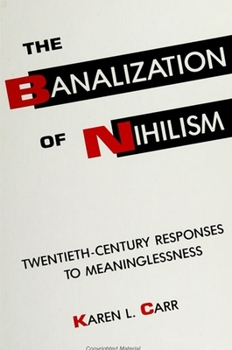The Banalization of Nihilism: Twentieth-Century Responses to Meaninglessness
Select Format
Select Condition 
Book Overview
After a historical and conceptual overview of the changing face of nihilism in the last century, Carr examines Nietzsche's diagnosis of nihilism as modernity's major crisis. She then compares the responses to nihilism given by the early Karl Barth and by Richard Rorty.
To some, nihilism is losing its crisis connotations and becoming simply an unobjectionable characteristic of human life. Carr argues that this transformation ultimately absolutizes community preference and reflects an increasing inability to criticize and change the existing structures of thought. The author contends that the uncritical acceptance of nihilism, which characterizes much of postmodernism, ironically culminates in its complete opposite-dogmatism.
Format:Paperback
Language:English
ISBN:0791408345
ISBN13:9780791408346
Release Date:February 1992
Publisher:State University of New York Press
Length:208 Pages
Weight:0.64 lbs.
Dimensions:0.6" x 6.0" x 8.9"
Grade Range:Postsecondary and higher
Customer Reviews
1 rating
A lucid and readable analysis of a beguiling subject.
Published by Thriftbooks.com User , 27 years ago
This is not only the best work that I have ever seen on the difficult subject of nihilism, but it is possibly the most well-written work of non-fiction that I have ever read. Carr begins by describing how nihilism became conceptualized and articulated with the onset of modernity. She then carefully defines her terms, clearly differentiating aspects or modes of nihilism (alethiological, epistemological, moral, metaphysical, and existential), in anticipation of what follows: a carefully considered analysis of the conceptual development of nihilism, as traced through the thinking of Friederich Nietzsche (for whom nihilism was the great crisis of the modern world, a terrific disease that threatened civilization, yet offered the opportunity for a genuine affirmation of life by wiping out false and outmoded valuations); theologian Karl Barth (for whom nihilism was the shattering precondition of faith and genuine religiousity); and contemporary post-modernist critic Richard Rorty (for whom nihilism would seem to be a welcome means of undermining or dissolving the oppressive power structures of the status quo). Carr concludes by convincingly arguing that the contemporary willingness to embrace nihilism wholesale as a liberating conception, without careful consideration of its more harmful potentials, ultimately undermines whatever liberating potentials it may hold, and, ultimately and ironically, reinforces the status quo rather than undermining it. Carr manages to make a good deal of sense out of extremely difficult material; her work is highly readable and well presented. Recommended reading for anyone with an interest in modern western intellectual history or contemporary cultural criticism. If you are about to throw the baby out with the bathwater, this book will make you think twice.





